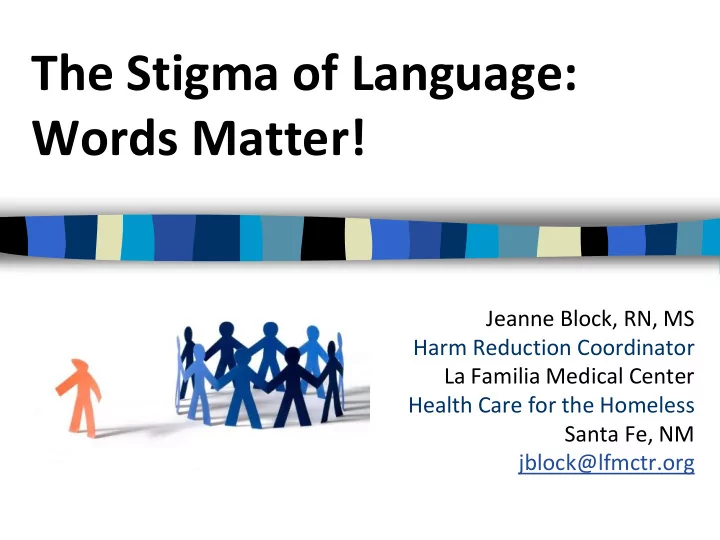

The Stigma of Language: Words Matter! Jeanne Block, RN, MS Harm Reduction Coordinator La Familia Medical Center Health Care for the Homeless Santa Fe, NM jblock@lfmctr.org
The Power of Language “ Wor ords ds ha have ve pow ower . They have the power to teach, the power to wound, the power to shape the way people think, feel, and act toward others.” — Otto Wahl, PhD, Professor of Psychology, author of Media Madness: Public Images of Mental Illness
Addiction or Substance Use Disorder? Addiction - a chronic, relapsing brain disease characterized by compulsive seeking and use of a drug, despite harm to self or others. Substance Use Disorder (SUD) – a specific diagnosis defined by the DSM- 5 as a “problematic pattern of use of an intoxicating substance leading to clinically significant impairment or distress.” Symptoms fall into 4 major groupings: impaired control, social impairment, risky use, and pharmacological criteria (i.e., tolerance and withdrawal). NIDA and SAMHSA continue to use both terms https://www.drugabuse.gov/publications/media-guide/science-drug-abuse-addiction-basics https://store.samhsa.gov/shin/content//SMA18-5063FULLDOC/SMA18-5063FULLDOC.pdf
What does the word st stigma igma mean to you?
Stigma labels individuals or groups as less worthy of respect than others separates “us” from “them” discrimination
3 Levels 3. Structural Stigma of Stigma 2. Social Stigma 1. Self-Stigma
Consequences of Self-Stigma • Internalization of negative stereotypes → feelings of worthlessness • Low self- efficacy (“why try?”) → difficulty in seeking or engaging in care • Increased rates of depression and anxiety I struggle [with] people offering me help, I still think that I’m not worthy of it … the guy at [treatment service] said the other day he sees it as me myself thinking I’m not worthy of anyone’s help. — Graham
Consequences of Social Stigma • Prejudice and discrimination by health care, social services, and law enforcement agencies and professionals • Family shame → isolation and denial “There's no law that says police officers have to carry Narcan … Until there is, we're not going to use it … .the cost of repeatedly treating people with Narcan is ‘sucking the taxpayers dry. ’ -Sheriff Richard K. Jones Butler County Ohio July 7, 2017
Consequences of Structural Stigma • No federal funding for syringe exchange • Drug court programs which are abstinence-only (no MAT allowed) • Incarceration instead of treatment Only 11% of inmates with substance use disorders received treatment at federal and state prisons or local jails. The National Center on Addiction and Substance Abuse at Columbia University
Case Study: Suzanna • Suzanna is 31 and has been addicted to heroin since age 16. • She has a 10-year old son and tells you that she really does NOT want her son to become “a junkie like me.” • Suzanna was arrested several years ago for selling heroin to an undercover cop and spent 2 years in prison. • None of her family visited her while she was in prison, and even though she earned her GED and was released early due to good behavior, she has been excluded from all family gatherings since she was paroled. • She states she had no treatment in prison, is very depressed and has been using again with friends since her release. She asks for your help to get into a Suboxone program or a methadone program. Can you identify an example of Self-Stigma, Social Stigma, and Structural Stigma in Suzanna’s story?
Let’s look at the meaning of the words clean and dirty … • “getting clean” • clean/dirty urine Why might these terms be stigmatizing? What alternative terms could you use?
What do you think of when you hear the word add addict ict ?
“Addict” is a word so singularly loaded with stigma and contempt that it’s somewhat appalling that we continue to let it be used so easily and indiscriminately…. Please do not destroy the totality of who I am by reducing me to that one word. The use of person-centric language may seem inconsequential, but I assure you, it is not. It is vitally important to…the people who, in the eyes of the world, are lumped into that “other” category you’ve created for them by calling them “an addict.” Please stop using the word “addict.” “I’m Breaking Up With the Word ‘Addict’ and I Hope You’ll Do the Same” Meghan Ralston, Huffington Post, March 2014
One thing I can do to end stigma is_________
Things you can do: • Think about and change the language you use • Look at your own beliefs, biases and prejudices • Educate peers, family, and friends about the disease of addiction • Advocate for: • enhanced services for clients • public and professional education • changes in discriminatory policies and laws • increased funding for prevention, harm reduction and treatment programs
“Act as if what you do makes a difference. It does.” ― William James, American philosopher and psychologist (1842-1910)
References • Substance Use Disorders: A Guide to the use of language, SAMHSA http://www.naabt.org/documents/Languageofaddictionmedicine.pdf • I’m Breaking Up With the Word ‘Addict’ and I Hope You’ll Do the Same, Ralston, Meghan, Huffington Post, 3/25/14 http://www.huffingtonpost.com/meghan-ralston/breaking-up-with-the-word- addict_b_5028999.html • Stigma, Discrimination, Treatment Effectiveness, and Policy: Public Views about Drug Addiction and Mental Illness , Barry, CL, McGinty, EE, Pescosolido, BA, & Goldman, HH. Psychiatric Services, October 2014. http://ps.psychiatryonline.org/doi/full/10.1176/appi.ps.201400140 • Patients with Addiction Need Treatment – Not Stigma, AMA Task Force to Reduce Opioid Abuse, American Society of Addiction Medicine Magazine, 12/15/15 https://www.asam.org/resources/publications/magazine/read/article/2015/12 /15/patients-with-a-substance-use-disorder-need-treatment---not-stigma • NIDA https://www.drugabuse.gov/publications/media-guide/science-drug- abuse-addiction-basics
Recommend
More recommend